

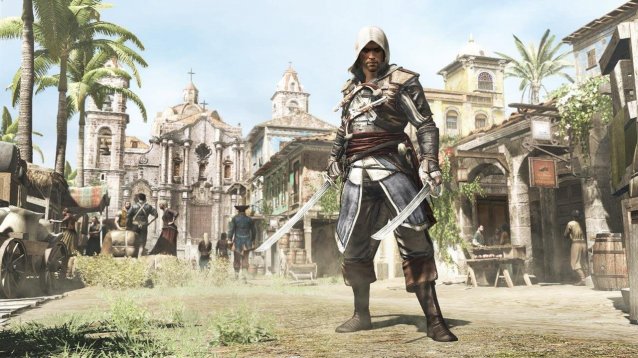
When game director Ashraf (Ash) Ismail talks about Assassin’s Creed IV: Black Flag, an inevitable sense of pride beams across his face—a trait that immediately displays the passion he and the team at Ubisoft are putting into the blockbuster title due out later this fall. This passion is heavily reflected in the game itself, which displayed an impressively vivid world in the demo at PAX Prime. I recently had the pleasure of playing said demo, and after the experience I sat down and chatted with Ash about the history behind the title, the benefits and challenges of going into the next generation, and Edward Kenway himself.
One thing that you said at the panel that I thought was really cool was that “history is our playground.” With the first Assassin’s Creed we saw that with the Crusades and with the second we saw it with the Renaissance. Those are two extremely distinct and popular time periods. Now you’re getting into the 1700s with the Golden Age of Piracy, a period that hasn’t been explored much. What drew you guys to this time period?
It was two things. One, we wanted to do a pirate game; like really do a pirate game. It’s something we wanted to do for a long time. To do a proper pirate game you need naval, you need land, and you need cities… so we felt that we were at a certain point where we could finally build this world. We also found that because of next gen we needed to create a world that was bigger… something that nobody has played before—at least with Assassin’s Creed, so we pushed ourselves. In doing so we asked ourselves how we could build this pirate game. The Golden Age of Piracy… once we started doing research on it, we thought it was awesome. There are so many crazy events that happen and crazy characters like Charles Vane and Black Beard and we wanted to tell who those characters were.
Black Beard was a guy named Edward Teach who actually created a persona called Black Beard; he was marketing himself to be this really wild and scary guy when actually he abhorred killing. This was a cool detail, and we felt that people needed to know that. We wanted to tell that story from an Assassin’s Creed perspective—the templars and assassins are always involved in important points in history and in this case the important factor was that it was the first real attempt at a democratic society and the new age, if you will. Something big was attempted, but you’ll see in our game that we do play with history. We don’t tell actual history, we kind of tell our version of history. So it’s a really important moment in time and there is a connection to things like the American Revolution as well, where things were learned from stuff like Pirate Republic. Pirates are also rather popular in the mainstream, and there was an opening in the media. You know, this doesn’t really exist, especially in video games. The last great pirate game was a long time ago.
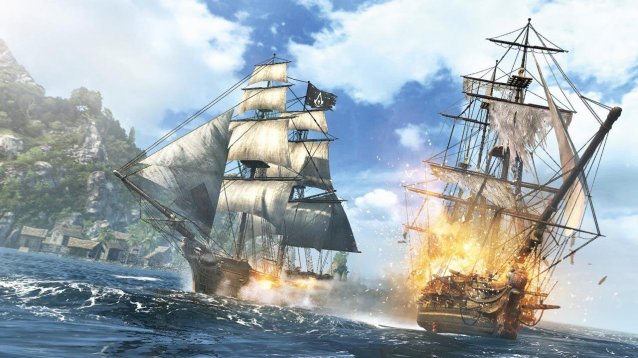
You also mentioned “credibility” over actual historical accuracy. Can you expand on what you mean by credibility in that context?
We say “history is our playground” and obviously templars and assassins don’t exist. We accept the fact that we’re a video game and playing with history in an era is something that I think connects to people. History resonates on a very deep level because it’s the definition of who we are, it’s the definition of how we got here in terms of culture and society. So being able to play in that is quite fun. Being able to play with actual historical figures that people know is cool as well, but then we give it our own spin because we have never attempted to teach history, we’re a video game. So again, we don’t make simulation games, we don’t make realistic games—we make credible games, we make authentic games. So, for example, with the naval combat or sailing a ship, if we wanted to do a real simulation of sailing a ship, it’s super complicated. It’s not that fun. We actually tried to see how far we could push a simulation of sailing. In the end we found that people had the most fun when they knew what was happening—when it was intuitive to play with but still felt like sailing, and that’s what we have today. And it works because it’s credible, not because it’s realistic. It’s meant to give you the feeling that, yes this could have existed like this. I believe I am sailing a ship. I believe I am doing boarding. Is that how it really works? No, but we don’t let that bother us.
Designing the overall environment of the Caribbean is obviously very different than Italy or the Holy Land of the Crusades. What were some of the challenges of making that environment while also making sure it was still playable for an Assassin’s Creed title with the stealth mechanics and things like that?
Well of course we have our major cities, so the comfort or being in a city in an AC game is really important, we’re not going to lose that. But for the more natural environments, ACIII did a huge push on having the frontier and we learned a lot from that, so we’re able to use that knowledge, those metrics if you will, the measurements of how the character moves through the environment. So even if you’re in a city, even if you want to remove all the art and design, effectively what you have are a bunch of different sized boxes and different sized lines and it’s quite abstract. A natural environment isn’t that different. If you remove all of the art, it just looks like a gray box map of an AC game. With the fidelity of next gen and with the physics we’ve been able to add along with a large and talented art team we can make it look like a really beautiful jungle or beach, but still you’ll e able to free-run, you’ll have high viewpoints that you can climb and sync up to. The difference, I think, is going to be the ways people see the environment. I think people will be romanticized by the Caribbean itself and the feeling that accompanies being in this really gorgeous environment and hopefully make you believe that it’s credible.
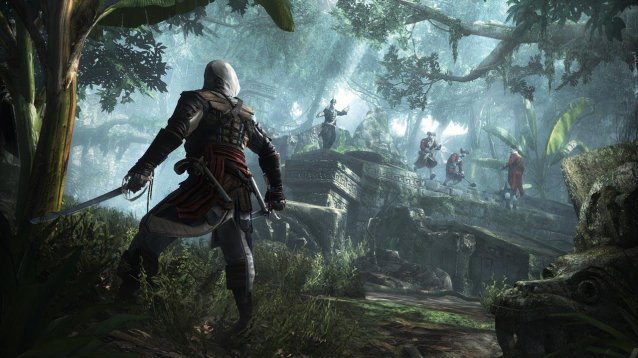
Normally when I play Assassin’s Creed my favorite thing to do is run around and assassinate people (shocking, I know). But the world is so immersive… in the demo all I wanted to do was go explore and check out the harpooning missions. Speaking of which, as we pointed out earlier the harpooning mission is homage to the Del Lago boss fight from Resident Evil 4. Can we expect to see many more easter eggs like that?
You’re the first to actually pick up on that, it was a reference when talking about harpooning early on because we loved it. We did look at a lot of games, we looked at what worked and what didn’t and what people loved and why they loved it, so we use a lot of references. Other easter eggs? The game has a lot of content, so for sure there are easter eggs, there are a lot of really neat things to find, but I’m not going to ruin any of them. But you don’t have to worry, there is lot of stuff.
You said in the panel that Edward was Edward, and in that respect you knew who he was as a character, but at the time were you planning him Conner’s grandfather and have a connection to the Kenway family?
Yes. When I say he was with the Kenway family I mean it was Edward, Haythem, Conner. The real definition of who they were and the details of their life wasn’t really that clear, but we had this idea that there was this family, the Kenways , and they did something really important in the feud between the templars and assassins and that were going to tell the story of these three guys. We knew that a good time ago, but you know Edward, what he looks like, what actually happened in his life… we kind of had an idea of when he was going to die, that he was a pirate, but that was about it. So it was just a basic skeleton of his family and that Haythem was a templar, which was something that we called out early. The Native American aspect, I’m not sure where that came from, but it was always those three guys.
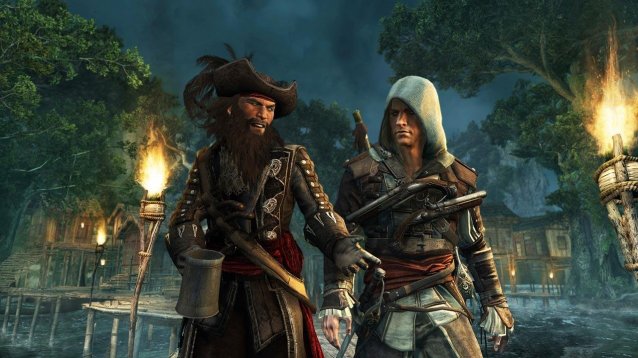
Each character in the Assassin’s Creed series has a distinct trait. Ezio is charmingly cocky, Altair is extremely serious, Conner is really aggressive… how is Edward? Pirates have a completely different attitude than what we have seen before in the series.
So Edward, we always describe him as being brash and selfish. He is charismatic, he has charm… but he doesn’t hide the fact that he is selfish, he doesn’t hide the fact that he is out for himself. To me that makes him a much more human character because you see his faults. I said in the panel that, even in a fight, he does these flourishes and stuff. It shows that he is a teenager in terms of maturity. He is really showoff-y and flamboyant in that manner. What’s great is that when he progresses through the story it’s a real human progression. I will say that I love the ending that we have. I really believe we have the best ending of any AC game because it’s a very human ending. It’s not “he saved the world.” Something simple happens, but for me its breathtaking, it’s truly beautiful. And you know, he is a guy who is trying to figure out who he is in life, so he takes on mentors. Sometimes he takes on the wrong mentors, like Charles Vane, and he ends up not really learning from him but actually being manipulated by him. At some point Edward realizes this is like, “what am I doing with this guy?” and so he is someone trying to figure out who he is in life. We describe him as being brash and selfish, but it is something that he grows from.
Assassin’s Creed IV: Black Flag is slated for release in North America for Xbox 360, PS3, and Wii-U on October 29th. It will also be released for PC, Xbox One, and PS4.
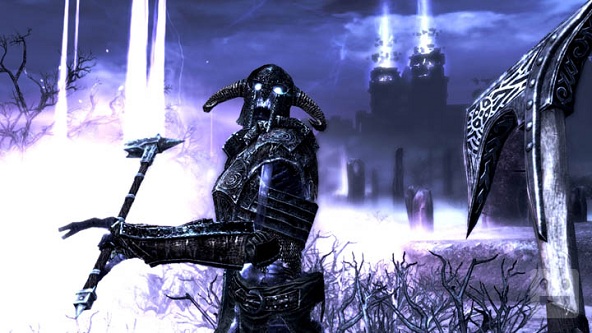


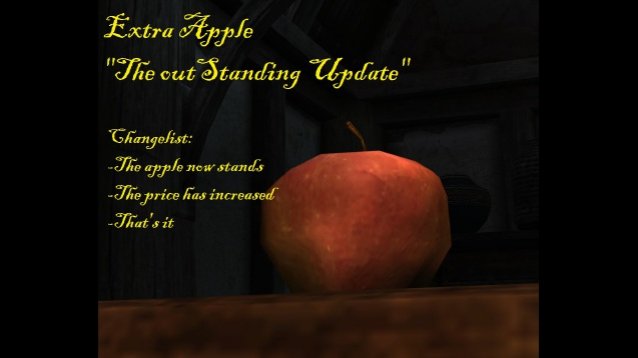
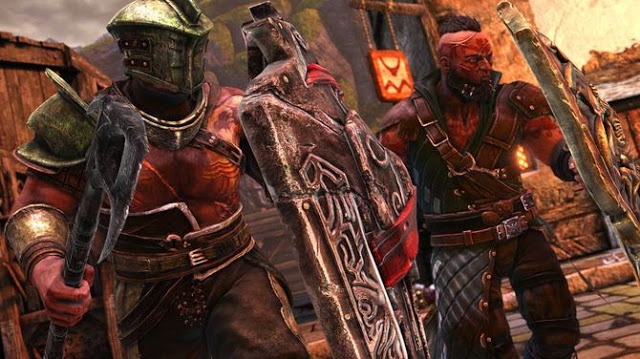 Nosgoth (PC) beginners guide
Nosgoth (PC) beginners guide Donkey Kong Country Tropical Freeze Wiki: Everything you need to know about the game .
Donkey Kong Country Tropical Freeze Wiki: Everything you need to know about the game .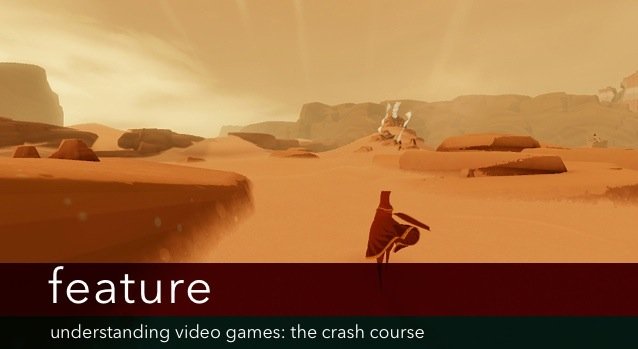 Understanding Video Games: The Crash Course
Understanding Video Games: The Crash Course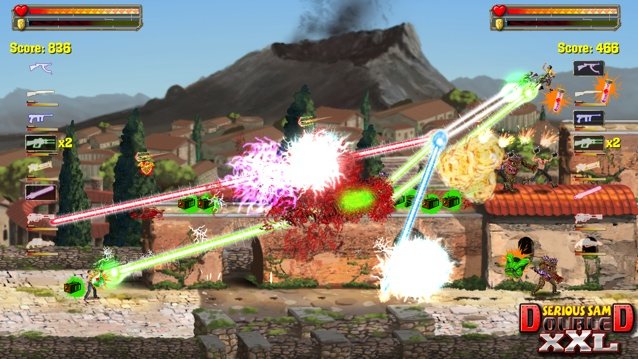 Serious Sam Double D XXL Review: A New Definition of Six Gun
Serious Sam Double D XXL Review: A New Definition of Six Gun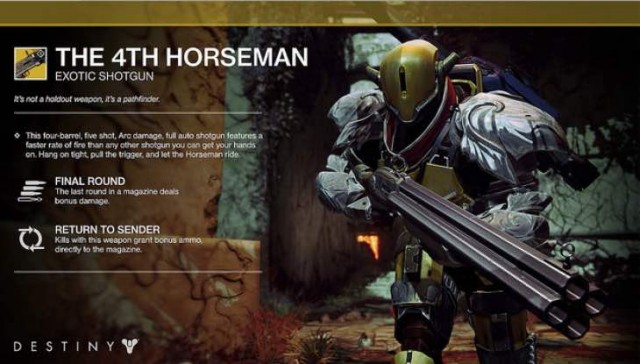 How to get Destiny The Dark Below DLC, The 4th Horseman Exotic Shotgun For PlayStation
How to get Destiny The Dark Below DLC, The 4th Horseman Exotic Shotgun For PlayStation